Commentary on Matthew 25:24
Verse Context: Matthew 25:24 states, "Then he which had received the one talent came and said, Lord, I knew thee that thou art a hard man, reaping where thou hast not sown, and gathering where thou hast not strawed."
Introduction
This verse is part of the Parable of the Talents, where Jesus conveys profound truths about stewardship, responsibility, and accountability. Each servant's response and handling of the talents illustrates the various attitudes that individuals may adopt towards their God-given responsibilities and opportunities. The servant who received one talent reflects a fearful and misinformed perspective on his master.
Commentary Insights
The Servant’s Mindset
The servant addresses his master in a manner that reveals his apprehensive attitude. Matthew Henry reflects on this, noting that the servant's understanding of his master is skewed. He perceives the master as "hard" and unjust, assuming that the expectation is beyond reasonable limits. This misconception plays a critical role in his failure to act responsibly.
Fear as a Barrier to Action
Albert Barnes emphasizes that this servant's fear led to inaction. His declaration of the master's harshness (i.e., “I knew thee that thou art a hard man”) indicates a lack of trust. He allowed his fear of failure to paralyze him from using the talent wisely. Fear, in this context, can be identified as a significant obstacle that prevents believers from stepping into their divine potential.
The Behaviour of the "One Talent" Servant
Adam Clarke points out that the servant's reasoning showcases a self-justifying mentality. He excuses his failure by blaming the nature of his master's character. Instead of taking initiative, he rationalizes his inactivity instead of recognizing his own role in the equation of stewardship.
Understanding the Master’s Character
Misinterpretation of Authority: The servant's interpretation of his master’s character significantly affects his actions. While he views the master as one who reaps where he does not sew, this view is contradicted by the broader biblical portrayal of God as benevolent and just. This misinterpretation reflects a lack of relationship and understanding of God's nature.
- Matthew Henry highlights the importance of understanding the just nature of God, who expects us to act within the abilities given to us.
- Albert Barnes adds that this misconception leads to a distorted view of God’s blessings and responsibilities.
- Adam Clarke points out that accurate knowledge of God’s character leads to greater faithfulness in service.
Accountability in Stewardship
This parable mandatorily asserts the principle of accountability. Each servant is summoned to provide an account of what they made of their entrusted resources, including talents. The one-talent servant’s failure illustrates a broader theme of the consequences of neglecting to use what one has been given.
According to Matthew Henry, it is vital that we understand our roles as stewards and that we will ultimately face evaluation for our actions or inactions. Albert Barnes reiterates that believers must actively engage with their given gifts and not allow fear or misconceptions to dictate their responses.
The Attitude of the Servant
The servant’s attitude reflects contemporary struggles. He transfers his irresponsibility to his perception of the master’s character. The fear-induced inaction serves as a warning that God's calling in our lives cannot be approached with reluctance or self-pity.
- Henry: The importance of proper judgment in representing God should lead us to faithful service.
- Barnes: We should not allow trepidation against perceived pressures to diminish our responsiveness to God.
- Clarke: Recognizing our limitations while remaining obedient is critical to living a faithful Christian life.
Application for Believers
Matthew 25:24 is a powerful call to action for believers. Misaligning one's understanding of God can lead to fear that stifles growth and hinder our call to stewardship.
- Self-Reflection: Examine personal fears that might be hindering one’s ministry or responsibilities.
- Understanding God: Prioritize learning about God’s true nature to overcome misconceptions that lead to paralysis.
- Faithful Service: Engage actively in one’s spiritual gifts, trusting that God is merciful and expects diligence rather than perfection.
Conclusion
The message embedded in Matthew 25:24 beckons every believer to evaluate their perception of God, their readiness to act, and their accountability as servants. By reflecting on the warnings given through this parable, we can foster an environment that encourages faithful stewardship amidst the fears and uncertainties of life.


